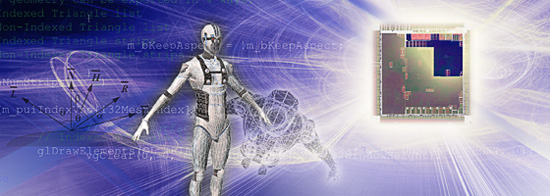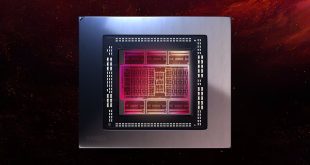A representative for Imagination Technologies, a leading developer of mobile graphics processing technologies, said that the company was looking forward to increase performance of its solutions so substantially that to be able to address fully-fledged personal computers.
Imagination Technologies once sold its Kyro graphics processing units for desktop PCs. Although the chip offered performance comparable to that of GeForce 2 GTS (a performance-mainstream solution back in 2001), it did not support then innovative hardware T&L [transform and lighting] engine and did not become popular because of that. Nowadays Imagination Technologies’ PowerVR graphics cores for mobile applications feature similar innovations found on desktop PC graphics processors. Obviously, mobile graphics chips cannot offer similar levels of performance as AMD Radeon and Nvidia GeForce provide at the moment, but since they are architecturally scalable, it is possible to build a high-end GPU for PCs featuring PowerVR architecture. As it appears, such a plan is not excluded by Imagination.
“We have our eye firmly on moving higher up the performance ladder,” said John Metcalfe, executive vice president and chief operating officer at Imagination Technologies, in an interview with Cnet News. “Not only hybrids, but full PCs. We would need to get to higher performance than the cores we have currently announced. But we don't have to change the architecture fundamentally in any way.”
Modern high-end graphics processors contain billions of transistors and are pretty hard to develop and manufacture. While it should be possible to “replicate” performance of affordable GPUs from AMD or Nvidia with chips based on PowerVR architecture, it will be extremely expensive to create a GPU comparable to AMD Hawaii or Nvidia GK110. Meanwhile, without high-end GPUs it is almost impossible to address the market of discrete graphics processors.
Since ImgTec does not build actual chips, it should find a partner eager to compete against graphics solutions designed by AMD and Nvidia. In fact, there is such a partner: Intel Corp. has been using PowerVR graphics cores inside its mobile SoCs for several years now and even has a stake in Imagination. Theoretically, it could integrate a large PowerVR GPU into its fully-fledged microprocessors for PCs and compete against traditional GPU designers. However, for some reason Intel prefers to use its own graphics cores for such chips.
KitGuru Says: Keeping in mind how quickly GPUs are evolving these days, ImgTec should set its performance bars high just to continue developing advanced GPUs for mobile applications…
 KitGuru KitGuru.net – Tech News | Hardware News | Hardware Reviews | IOS | Mobile | Gaming | Graphics Cards
KitGuru KitGuru.net – Tech News | Hardware News | Hardware Reviews | IOS | Mobile | Gaming | Graphics Cards



